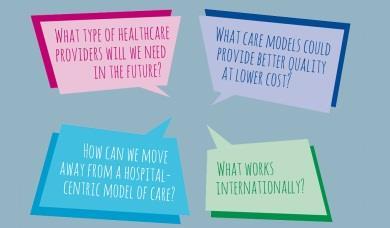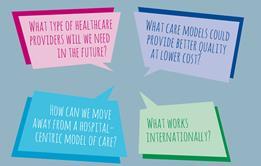The recent NHS Futures Summit provided a forum for health policymakers and NHS staff to exchange transformative ideas. Now Monitor, NHS England and the Trust Development Authoritywant to see a wider discussion on how the NHS can transform care in the 21st century.
The NHS is at a crossroads. There is an emerging consensus within the sector about the unprecedented scale of the challenges the health service faces over the next 10 years.
However, what we should all do about it remains an open question.
Constraints and commitments
We are all committed to the values of a universal healthcare system, open to all and free at the point of use.
We also acknowledge that the combination of rising healthcare demand, increasing costs and flat real-terms funding will continue to place significant pressure on the NHS and its services.
Research suggests that the NHS could face an estimated £30bn financial shortfall by 2021. Within these constraints the NHS needs to be able to continue to provide quality services for an ageing population, increasing numbers of people with long-term conditions, and more people surviving cancer.
‘Fundamentally, the way things are done needs to change. We need to adapt or face the consequences’
Fundamentally, this means that the way things are done needs to change. We need to adapt or face the consequences.
Only the best will do
For all of us who care passionately about the NHS, a service that isn’t the very best it can be doesn’t bear thinking about.
Our task nationally and locally is to rise to these daunting challenges and ensure that patients get the high quality services they deserve on a sustainable basis.
Already the NHS nationally is addressing some of these challenges through the review of urgent and emergency care, the proposals on seven-day working, and the standardisation of some specialised services like stroke.
But there are potentially many more ways where services can be shaped and moulded locally around patients and their needs.
We believe there are a number of interesting new and innovative ideas that local NHS leaders need to seriously consider.
That’s why NHS England, Monitor and the Trust Development Authority have been working together on a project to look into what might be possible.

Exploring innovative ways of working
Our recent call for action document set out our aims, and now we are able to give some examples of alternative care models for consideration and debate.
The recent NHS Futures Summit provided a forum for health policy makers, academics and NHS staff to exchange transformative ideas on how quality healthcare can be delivered and debate how they could be adopted.
This is not abstract blue-sky thinking but concrete discussion about the practicalities of implementing change, to discover what works, how it works and whether it could work for us.
One example considered was the pioneering Martini-Klinik in Germany. Patients are travelling more than 180 miles for prostate surgery at this centre, despite the availability of local providers.
The centre’s clinical reputation for delivering a better quality of treatment appears to outweigh the advantages of having care closer to home. This is one example of several suggesting that for certain conditions, centralised units offering concentrated expertise and technology could provide the most effective care.
The summit also considered other ideas, such as integrating care by putting a lead clinician in charge of all the primary, secondary and social care received by frail elderly patients.
‘The NHS has a long and successful history of improving the care it offers, and we should not underestimate our collective ability to draw on new ideas’
There is a lot more to do to explore these ideas and whether they might work in the NHS, but they provide food for thought about what might be possible and could be practicable.
NHS leaders at the conference also discussed barriers to introducing innovative practices, concluding that the obstacles are often neither financial nor political but cultural.
Fortunately, the NHS has a long and successful history of improving the care it offers, and we should not underestimate our collective ability to draw on new ideas and thinking that could change the life of patients.
Don’t jump to national conclusions
Clearly changes must be evidence-based, and driven by local NHS leaders, using the detailed understanding they have gained through their interaction with patients, clinicians, staff and other local partners. At this stage we should not jump to national conclusions about what is best.
Local NHS health and care providers and commissioners need to own the process of transforming the NHS, so they can introduce innovative new practices that work for them in the context of their local health economy.
‘We are urging the debate to being in earnest’
Nevertheless, all of us need to view the NHS as a whole, and seize opportunities where innovation can reach across organisations and bridge narrow sectoral interests; focusing on the wider needs of patients and introducing change that improves their health and makes their lives easier, rather than concentrating solely on improving quality and efficiency from an organisational point of view.
What we are urging is for that debate to begin in earnest. We have opened the conversation with some ideas, but now we’d like to see a wider discussion about how the NHS can transform the care it offers in the 21st century.
David Bennett is chief executive of Monitor
Downloads
David Bennett: 'Adapt or face the consequences'

It’s time for a wider discussion on how the NHS can transform care
 Currently
reading
Currently
reading
David Bennett: 'Adapt or face the consequences'
- 2
- 3
- 4
- 5



































6 Readers' comments